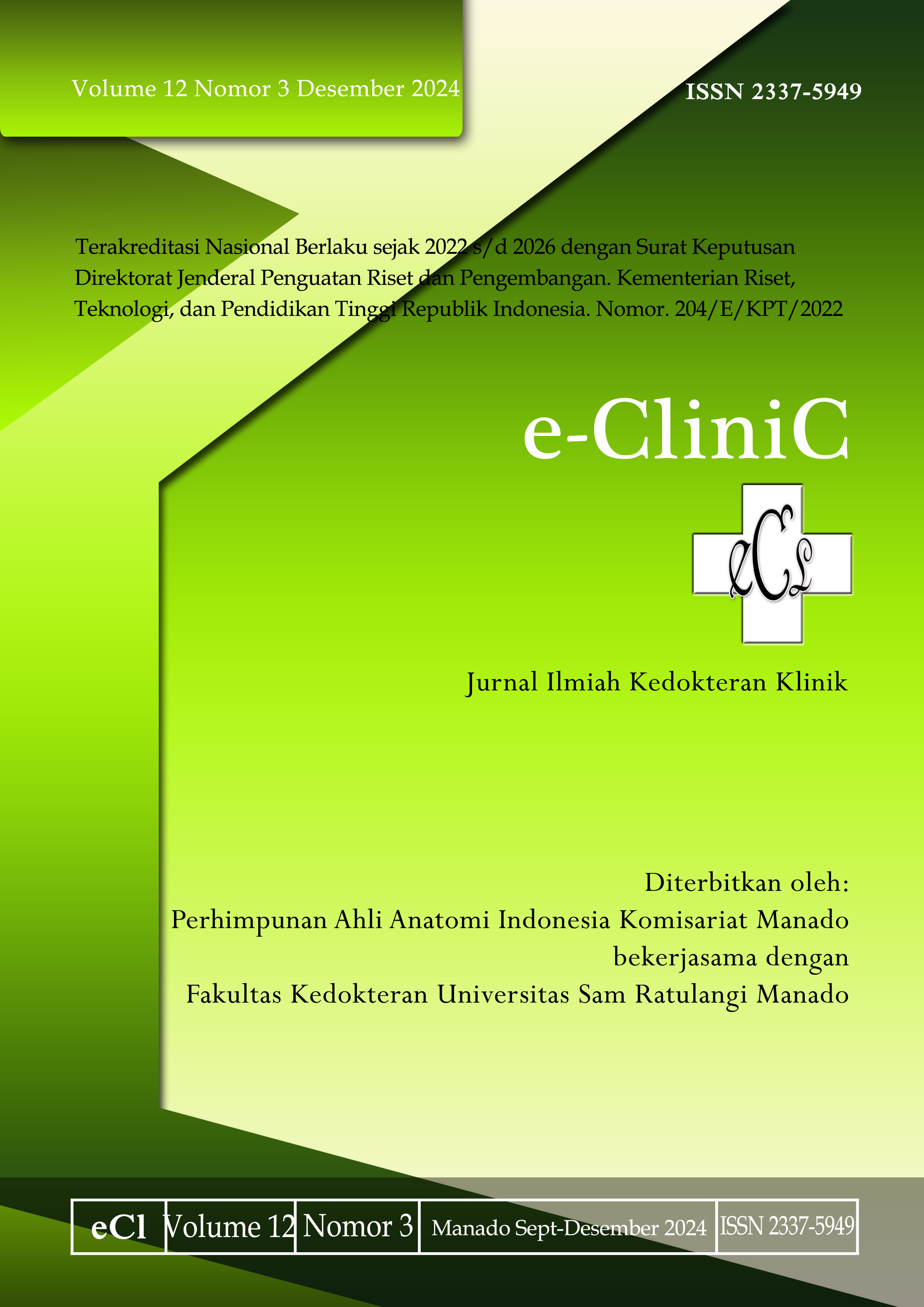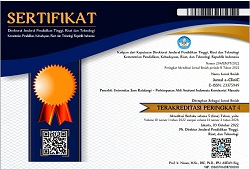Rasio Neutrofil Limfosit sebagai Prediktor Kejadian Kebocoran Anastomosis pada Pasien Kanker Kolorektal
DOI:
https://doi.org/10.35790/ecl.v12i3.58246Abstract
Abstract: Anastomotic leakage is a serious complication following colorectal cancer resection that can increase morbidity and mortality. This study aimed to analyze the potential of the neutrophil-lymphocyte ratio (NLR) as a predictor of anastomotic leakage in colorectal cancer patients. This was a retrospective analytical and observational study involving 30 patients who underwent colorectal cancer resection and anastomosis at Prof. Dr. R. D. Kandou Hospital in Manado. The NLR values were analyzed preoperatively and on the first (D+1), third (D+3), fifth (D+5), and seventh (D+7) postoperative days. The results showed significant differences in NLR values between leakage and non-leakage groups across all phases (p<0.001). The receiver operating characteristic (ROC) curve analysis yielded optimal NLR cut-offs for leakage prediction: preoperative >2.1150, D+1 >3.4750, D+3 >2.7650, D+5 >3.0200, and D+7 >3.2850, with sensitivity and specificity reaching 100% in several phases. In conclusion, neutrophil-lymphocyte ratio has a potential as an accurate predictor of anastomotic leakage, enabling early detection and improved risk management. Further research with larger samples is needed to validate these findings and explore their clinical applications.
Keywords: neutrophil-lymphocyte ratio; anastomotic leakage; colorectal cancer
Abstrak: Kebocoran anastomosis merupakan komplikasi serius pasca reseksi kanker kolorektal yang dapat meningkatkan morbiditas dan mortalitas. Penelitian ini bertujuan menganalisis potensi rasio neutrofil limfosit (RNL) sebagai prediktor kejadian kebocoran anastomosis pada pasien kanker kolorektal. Penelitian ini menggunakan metode observasional analitik retrospektif, melibatkan 30 pasien yang menjalani reseksi dan anastomosis kanker kolorektal di RSUP Prof. Dr. R. D. Kandou Manado. Nilai RNL dianalisis pada fase preoperatif, hari pertama (H+1), ketiga (H+3), kelima (H+5), dan ketujuh (H+7) pasca operasi. Hasil penelitian memperlihatkan perbedaan bermakna nilai RNL antara kelompok kebocoran dan tanpa kebocoran pada semua fase (p<0,001). Analisis kurva ROC menghasilkan cut-off optimal RNL untuk prediksi kebocoran: preoperatif >2,1150, H+1 >3,4750, H+3 >2,7650, H+5 >3,0200, dan H+7 >3,2850, dengan sensitivitas dan spesifisitas mencapai 100% pada beberapa fase. Simpulan penelitian ini ialah rasio neutrofil limfosit memiliki potensi sebagai prediktor yang akurat untuk kebocoran anastomosis, serta memungkinkan deteksi dini dan manajemen risiko yang lebih baik. Penelitian lebih lanjut dengan sampel yang lebih besar diperlukan untuk memvalidasi temuan ini dan mengeksplorasi aplikasi klinisnya.
Kata kunci: rasio neutrofil limfosit; kebocoran anastomosis; kanker kolorektal
References
Issa IA Noureddine, M. Colorectal cancer screening: an updated review of the available options. World J. Gastroenterol. 2017;23(28):5086–96. Doi: 10.3748/wjg.v23.i28.5086
Jeon J, Du M, Schoen RE, Hoffmeister M, Newcomb PA, Berndt SI, et al. Determining risk of colorectal cancer and starting age of screening based on lifestyle, environmental, and genetic factors. Gastroenterology. 2018;154(8):2152–64.e.19. Doi: 10.1053/j.gastro.2018.02.021
Daniel VT, Alavi K, Davids JS, Sturrock, Harnsberger CR, Steele SR, et al. The utility of Delphi method in defining anastomotic leak following colorectal surgery. Am J Surg. 2019;219:75-9. Doi: 10.1016/j.amjsurg.2019.05.011
Hosseini SV, Alghataa KA, Bananzadeh A, Bahrami F, Khazraei H, Tadayon SM, et al. The risk factors of anastomotic leakage after rectal cancer surgery. Int J Cancer Manag. 2022;15(6):e120889. Available from: https://doi.org/10.5812/ijcm-120889
Hirst NA, Tiernan JP, Millner PA, Jayne DG. Systematic review of methods 95 to predict and detect anastomotic leakage in colorectal surgery. Colorectal disease. 2013;16(2):95-109. Available from: https://doi.org/ 10.1111/codi.12411
Goulder F. Bowel anastomoses: the theory, the practice and the evidence base. World J Gastrointest Surg. 2012;4(9):208-13. Doi: 10.4240/wjgs.v4.i9.208
Verberne C, Wiggers T, De Bock GH, Grossmann I. Sensitivity and specificity of CEA in colorectal cancer follow-up. Eur J Surg Oncol. 2014;40(11):S104-S104. Available from: https//www.ejso.com/article/ S0748-7983(14)00824-5/abstract
Essa MS, Abdelaal MK, Zayed ME, Mshantat AM, Salama AM, Ahmad KS. Role of biomarkers in early detection of anastomotic leakage and follow up of patients with colorectal surgery managed by enhanced recovery protocol. Int Surg J. 2021;8(11):3243. Available from: https://doi.org/10.18203/ 2349-2902.isj20214359
Ryan B. Morgan, Benjamin D. Shogan. 2022.The science of anastomotic healing. Semin Colon Rectal Surg. 2022;33(2):100879. Doi: 10.1016/j.scrs.2022.100879.
Özdemir DB, Karayiğit A, Dizen H, Ünal B. Evaluation of preoperative neutrophil-to-lymphocyte ratio and platelet-to-lymphocyte ratio for their predictive value in determining short-term mortality in patients with operable colorectal cancers. Düzce Tıp Fakültesi Dergisi. 2022;24(1):67-73. Available from: https://doi.org/10.18678/dtfd.1063922
Downloads
Published
How to Cite
Issue
Section
License
Copyright (c) 2024 Jimmy Panelewen, Michael Tendean, Fima Langi, Nuzly Q. Akmal

This work is licensed under a Creative Commons Attribution-NonCommercial 4.0 International License.
COPYRIGHT
Authors who publish with this journal agree to the following terms:
Authors hold their copyright and grant this journal the privilege of first publication, with the work simultaneously licensed under a Creative Commons Attribution License that permits others to impart the work with an acknowledgment of the work's origin and initial publication by this journal.
Authors can enter into separate or additional contractual arrangements for the non-exclusive distribution of the journal's published version of the work (for example, post it to an institutional repository or publish it in a book), with an acknowledgment of its underlying publication in this journal.
Authors are permitted and encouraged to post their work online (for example, in institutional repositories or on their website) as it can lead to productive exchanges, as well as earlier and greater citation of the published work (See The Effect of Open Access).







